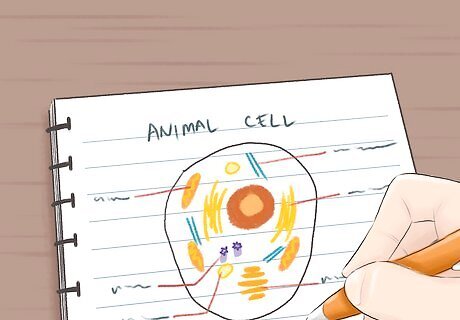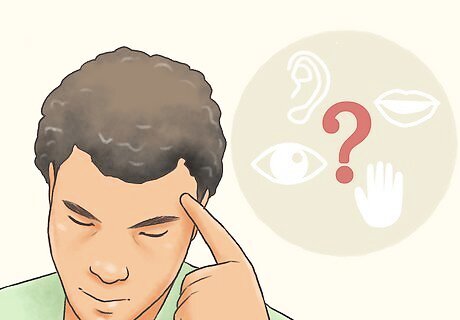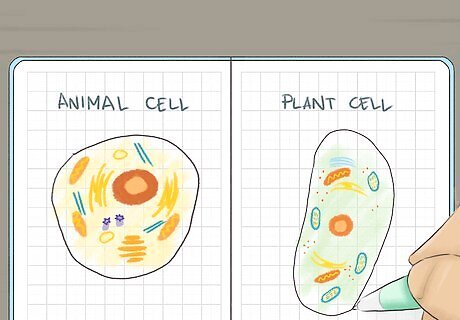
views
Coming to Class Prepared

Read your biology book ahead of time. Read any relevant chapters before class so that you can understand the lecture better. You will also be aware of any concepts that you have difficulty understanding. You can ask the teacher before class or during class to clarify these concepts.

Take note of important biology concepts. As you are reading and studying before class, you should take notes. This way, you solidify the material in your mind. You should also scan or redraw any figures or diagrams that are important (e.g. they show up multiple times in the chapter).

Bring notes to class. For every class, you should bring notes from previous classes. You should also bring your notes from independent studying, including pictures. This can give you an edge on taking notes in class, which will free up more time for you to absorb what the teacher is saying.
Focusing in Lecture Classes

Take notes. While you are in class, you will need to be diligent about taking notes on important topics. Anything that the teacher writes on the board should be in your notes. Also, if you are told to write something down, do it. Never assume that you will remember important topics. Also take careful notes about assignments and tests, this will help you understand what the instructor is looking for.

Pay close attention to biology lectures. Biology is a complex subject, and the lectures can get very involved. Avoid the urge to use your phone or chat with classmates beside you. Focus only on what the instructor is discussing. It is a good idea to record the lectures, but you must have your instructor's permission ahead of time.

Ask questions. Your instructor's job is to help you learn. When you are struggling to understand something that they are teaching, speak up and ask them. You can even wait until office hours or after class if you are uncomfortable speaking in front of the class. For example, you might ask “Professor, how does a cell replicate?”

Complete all homework. Homework is given for two reasons. Either your instructor wants to grade it, or they want you to learn the material so they can grade you on similar concepts later. Both are important to your success in the class. Dedicate time every day after class to do your biology homework.
Focusing in Lab Classes

Read the lab ahead of time. When you read the lab ahead of time, you know what to be prepared for. Make sure that you understand the concepts and procedures addressed in the experiment. Write down any questions, especially those pertaining to safety, before lab.

Follow safety instructions. Biology labs are used to reinforce concepts learned in lecture, and to prepare students for more advanced lab work. Following the safety precautions not only protects you, it is often a part of your grade. In addition the the general lab rules that your instructor gives you, you should look for any special safety precautions mentioned in the literature for each experiment.

Choose a good partner. If you have the privilege of choosing your lab partner, make sure to choose someone who is there to do well. Your success can be helped or hindered by your partner's drive. Single out someone you know is committed to biology and ask them ahead of time to be your partner.

Divide the work. Most labs are designed to be a two (or more) person job. Avoid the urge to do it all, and delegate some work to your partner. If your partner seems to be doing the majority of the work, pitch in and make sure you understand the concepts. Labs are designed to reinforce the concepts covered in your biology class.
Studying Biology Effectively

Make a study schedule. Spreading out study time is crucial to success in a biology course. This technique keeps your studying disciplined and predictable.The general rule for biology courses is that you should set aside roughly two hours of study time for each hour of class.

Know your learning style. Understand what types of information you retain best. You aren't likely to have control over how the instructor lectures, but you will have control over how you study. Use this to your advantage and study the materials in the way you learn best. The recognized learning types are: Visual - You prefer to include pictures, images, videos, etc. Auditory - You like hearing information and/or integrating music and sounds. Linguistic - You learn information when it is in the form of language (written or spoken). Kinesthetic - You are a “hands on” learner. Movement and physical touch help you retain information. Mathematical - You rely on systems of logic to learn. Interpersonal - Most of your learning occurs in a group setting. Intrapersonal - Learning alone suits you best.

Avoid cramming sessions. Research shows that cramming is ineffective. Using the same amount of study time spread over days or weeks will allow your brain to retain more information than a single cram session. Focus on one biological concept at a time, and spread out complicated processes over multiple sessions. Remember to take a study break every forty-five minutes to rest your brain. Even just 15 minutes of studying every day can help you retain the information. Review old material each session. Use note cards for quick, on the go studying.

Attend a study group. Studying as a social activity can be very beneficial. It allows you to see different points of view on biological concepts, and different study techniques. Offer your take on things as well, you might find that you know things that others in the group have missed. In your study group, try explaining a biological process out loud to everyone while they verify what you're saying with your notes. Then, they can let you know if there are any gaps in your understanding.
Grasping Basic Biology Concepts

Understand that all organisms are composed of cells. The most basic foundation of biology is that all organisms are composed of some number of cells that are independent of each other, but function as a multicellular organism. The number of cells varies from single celled organisms to organisms with trillions of cells. Keep in mind that not all cells in an organism have to be identical to one another (e.g. brain cells and heart cells). EXPERT TIP Justine Borzumato Justine Borzumato Biology Teacher Justine Borzumato is a Biology Teacher at the Wardlaw+Hartridge School in Edison, New Jersey. Justine has been teaching biology since 2015 and has taught courses including AP Biology, Honors Biology, Epidemiology, and Anatomy and Physiology. She received her Bachelor of Science in Biology from Loyola University Maryland and a Master of Science in Biology from New York University. Justine Borzumato Justine Borzumato Biology Teacher Relate biological concepts to everyday life. Use analogies between complex biological mechanisms and common experiences we encounter to clarify abstract ideas. Compare specialized organelles to high school classrooms, each with different teachers, energy flow to diminishing monetary returns, or cyclical processes to interconnecting household tasks. Tangible examples can stick far better than dry textbooks.

Remember essential molecules. Cells function by moving molecules and energy back and forth. There are a number a molecules that are key to life as we know it. You should have an understanding of these biologically significant molecules and what they do. This will make understanding biology much easier. For example, ATP (Adenosine Triphosphate) is the energy storage molecule. It allows cells to store energy and use it later.

Analyze inherited traits. No organism lives forever. Instead, organisms reproduce one generation after another. Their genetic information is passed down through DNA (Deoxyribonucleic Acid) to guide the development of their offspring. Traits that help an organism survive in its environment are favored and get reproduced more frequently, while other traits die off. This forms the basis for concepts such as inheritance and evolution, and is central to the biology field.


















Comments
0 comment